Food insecurity in Missouri continues to be a major issue, affecting one in five households with children. In an effort to raise awareness on the growing issue, Missouri Foundation for Health has released the newest publication in its Health Equity Series: Food Insecurity. This comprehensive report examines Missouri’s food system, including how social determinants of health impact food security and food access, as well as the connection between disparities in health outcomes and an inequitable food system.
The United Nations Food and Agriculture Organization defines food security as a situation that “exists when all people, at all times, have physical, social and economic access to sufficient, safe and nutritious food to meet their dietary needs and food preferences for an active and healthy life.” Food insecurity can lead to a host of health problems, including diabetes and paradoxically, obesity. This is due to the fact that for many people, high-calorie, processed and nutrition-deficient foods are all they can afford and/or have access to.
Ryan Barker, vice president of Policy at MFH is hoping this report will serve as a resource to those looking to step in and assist Missouri residents with getting what they need to overcome food insecurity in our region.
“The face of hunger has definitely changed, and the numbers regarding food insecure families in Missouri are staggering. No one should have to worry about having enough food.”
Ryan Barker
According to the report, common characteristics of those who are food insecure include:
- low-income households
- households headed by a single parent
- households headed by an African-American or Hispanic person
- households within a principal city of a metropolitan area
- individuals who are renters
- individuals who are younger in age
- individuals who are less educated
A variety of people from different background experience food insecurity in Missouri. Some suffer because they live in urban “food deserts,” while people in rural areas often face transportation issues in reaching grocery stores many miles from where they live.
Food insecurity rates have been rising in Missouri for the last 10 years. On a scale of one to 50, where one is the most food insecure and 50 is the most food secure, Missouri ranked sixth for food insecurity and second behind Arkansas for hunger.
In 2013 in the U.S., one in four Hispanic households (23%) and African-American households (26%) experienced food insecurity. The rate for both of these populations was almost twice that of the national average (14%).
Missouri Foundation for Health continues to make significant investments toward reducing food insecurity in the state. Given the fact that many food insecure households seek assistance through food banks, in late 2013 MFH created a series of Emergency Food Access grants. The Foundation partnered with the Food Bank for Central and Northeast Missouri, Ozarks Food Harvest, Southeast Missouri Food Bank and St. Louis Area Food Bank to support infrastructure improvements. Each organization received $1 million to enhance both its facilities and those of its community-based partners.
“This is a serious issue, and we, as an organization, have been committed to using our resources to fight against hunger in our state,” said Dr. Robert Hughes, president and CEO of MFH. “Nutritious food options should be affordable and accessible in all of our communities. We are doing what we can to address this problem through various initiatives at the Foundation, including our infant mortality and childhood obesity work.”
Read the full report here.
View the other topics in our Health Equity series.



